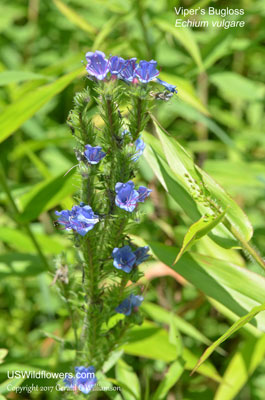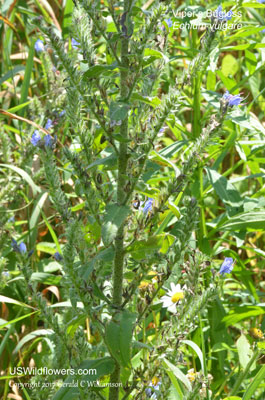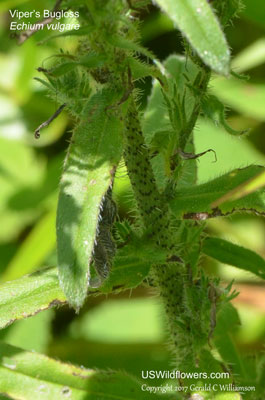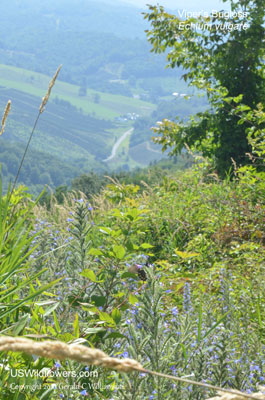Viper's Bugloss, Blueweed, Blue Devil, Blue Borage, Common Echium - Echium vulgare
|
Echium vulgare - Viper's Bugloss, Blueweed, Blue Devil, Blue Borage, Common Echium.
Echium is a genus of around 60 species worldwide, native primarily to Europe, northern Africa and western Asia. There are 8 or 9 species found in the United States, none of which are native, and all but Echium vulgare with very limited distribution in the United States. The genus name comes from the Greek for viper, referring to the shape of the seed, which is similar to that of the head of the poisonous snake.
Echium vulgare is the most widespread of the genus in the United States, being mostly a species of the northeast and eastern midwest, but found in Alaska and all but four of the continental states. It is missing (so far) from Hawaii, Alabama, Florida, Nevada, and North Dakota. The USDA map to the right is out of date, with the species having been identified in several western states since the map was updated. The plant is a native of Mediterranean Europe, but is found here in dry pastures and roadsides across the country. The common name Bugloss (pronounced bew-gloss) is from the Greek word for ox-tongue, bouglosson, which refers to the rough texture and shape of the leaves.
Found in:
AK, AR, AZ, CA, CO, CT, DC, DE, GA, IA, ID, IL, IN, KS, KY, LA, MA, MD, ME, MI, MN, MO, MS, MT, NC, NE, NH, NJ, NM, NY, OH, OK, OR, PA, RI, SC, SD, TN, TX, UT, VA, VT, WA, WI, WV, WY | 
Distribution of Echium vulgare in the United States and Canada:

Blue=Native; Grey=Introduced
Map from USDA Plants Database:
USDA, NRCS. 2017. The PLANTS Database (http://plants.usda.gov, 25 Apr 2025). National Plant Data Team, Greensboro, NC 27401-4901 USA.
Search Our Database: Enter any portion of the Scientific, Common Name, or both.
Do a general Google search of the entire site:
#ad
 Follow USWildflowers on Twitter
#ad
| | Site: Grayson Highlands State Park, Grayson County, VA Date: 2017-August-03 | Photographer: Gerald C. Williamson
Nikon D7000
Tamron SP 90MM f/2.8 AF Macro | | The flower of Echium vulgare is blue to pink with 5 irregular lobes, and 4 strongly exserted stamens, and one more which is not quite as long as the others. The threadlike pistil is split at the tip. You can see in this photo the 5 pink stamen filaments, and the white style which is also pubescent - typical for this plant. | | 
| | Site: Grayson Highlands State Park, Grayson County, VA Date: 2017-August-03 | Photographer: Gerald C Williamson
Nikon D7000 | | The inflorescence of Viper's Bugloss are many sometimes-branching helical cymes arising in the upper part of the stem, usually in leaf and bract axils. | | Click on the photo for a larger image

| | Site: Grayson Highlands State Park, Grayson County, VA Date: 2017-August-03 | Photographer: Gerald C Williamson
Nikon D7000 | | Echium vulgare has an erect, hairy stem. The stem leaves are sessile, alternate, and up to about 10 inches long, reducing in size up the stem. There is also a rosette of petiolate basal leaves. | | Click on the photo for a larger image

| | Site: Grayson Highlands State Park, Grayson County, VA Date: 2017-August-03 | Photographer: Gerald C Williamson
Nikon D7000 | | While most photos identified as Echium vulgare have spotted stems like those shown on this page, it is possible that this is what would be classified as some as Echium pustulatum. It seems, however, that species has been recently reclassified as Echium vulgare var. pustulatum, allowing that conflicting ID to fall under the E. vulgare name. The stem (and leaves, and inflorescence) is bristly-hairy, with some of the hairs being quite stiff and cactus-spine like. | | Click on the photo for a larger image

| | Site: Grayson Highlands State Park, Grayson County, VA Date: 2017-August-03 | Photographer: Gerald C Williamson
Nikon D7000 | | Viper's Bugloss grows to about 3 feet high, here along a fence row in the highlands of Virginia. | | Click on the photo for a larger image

|
References used for identification and information:
|
|
| |
| #ad
|
|







